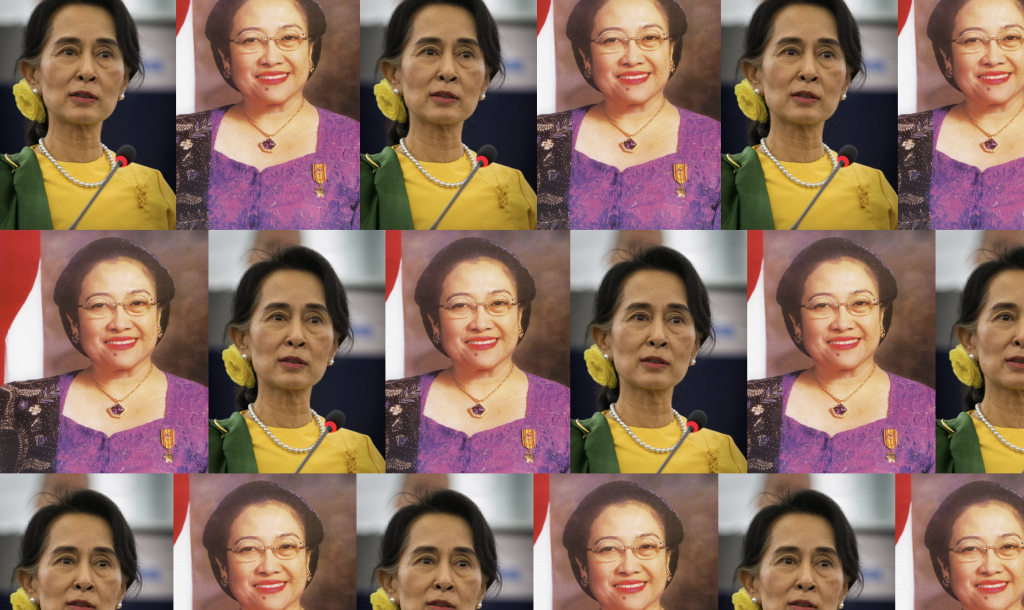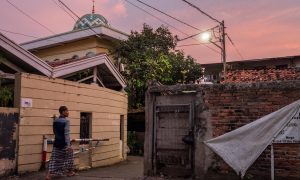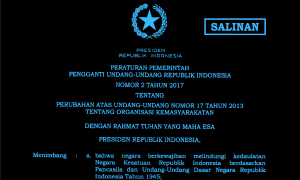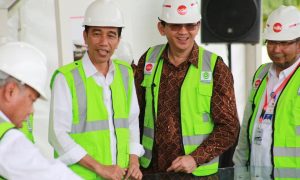EDITOR’S NOTE: the following opinion piece by Indonesian journalist and filmmaker Dandhy Laksono made headlines after he was reported to police under Indonesia’s controversial online defamation laws for comparing Megawati Soekarnoputri to Aung San Suu Kyi. For readers’ interest we are pleased to share a translation of his post prepared by Hellena Souisa.
……………
It’s hard not to join the crowd of those furious with the 1991 Nobel Peace Prize laureate, Aung San Suu Kyi, for what has happened to the Rohingya. A former political prisoner of 15 years, Suu Kyi is now considered to have power and influence after her party (NLD) won national elections in November 2015. However, she has been seen as inadequate in preventing the slaughter of ethnic Rohingya Muslims by Myanmar’s army and Buddhist hardliners.
In addition to being the leader of the winning party of the election, she is also the State Counsellor and Minister of Foreign Affairs. The office of Counsellor is equivalent to Prime Minister and has a 5 year term. Of course, in a country that has a number of powerful generals, I think political assessments cannot be naive. Often military members have their own agenda that is not always in line with the civilian government in power.
President John F Kennedy was feeling overwhelmed with the agenda of his generals at the Pentagon and the CIA amid the Cuban missile crisis and the Bay of Pigs invasion (1961), which brought him to the brink of starting a nuclear war with the Soviet Union. Likewise, Suharto and his comrade generals built contacts discreetly with Allied parties in Kuala Lumpur and Singapore, when then President Sukarno was promoting a ‘Ganyang Malaysia’ (‘crush Malaysia’) campaign in 1963.
Our judgement of Suu Kyi in the case of the Rohingya should therefore always consider this delicate balance of power within the country, especially as Myanmar has been under the power of a military regime for more than 50 years, one which also had a record of killing civilians: for example, the bloody 8888 uprising in which 3,000 to 10,000 people died. (The number of 8888 is taken from the date of the event, 8 August 1988, while the resistance movement also has the other “magic number” of 7777, from the series of protests started on 7 July 1977).
Nevertheless, it seems that Suu Kyi did not push back in the same way that Kennedy did when he felt he was being harassed by the hardline generals. Instead, there is an impression that Suu Kyi is part of the problem. She always mentions that the case of the Rohingya is another example of violence that also occurs among other ethnic groups, such as the Karen.
The disappointment in Suu Kyi was further evident in May 2017, when the Myanmar Government refused and denied UN reports of what was happening to the Rohingya in Rakhine State. In June 2017, the Myanmar government shut down access to UN investigators.
In 2013 Suu Kyi even made a comment that was considered racist, when being interviewed by the BBC reporter, Mishal Husain. After the interviewer bombarded her with questions about the Rohingya case, Suu Kyi said “no-one told me I was going to be interviewed by a Muslim”, according to a biography written by Peter Popham. Moreover, there is an excerpt of Suu Kyi’s interview which showed her determination to accumulate power after she won the election: she said she would be “above the president, I will make all the decisions because I am the leader of the winning party.” The context of the statement was an affirmation of Suu Kyi that although the military group challenged her with a constitution that made her ineligible to be president (because both of her children hold a British passport) she considers herself more powerful than the head of state.
So, how does this have anything to do with Megawati?
In a different context and with different details, Indonesians also have experienced a situation where an icon of the struggle for democracy—one who was once repressed by the New Order regime (such repression meeting its peak in the events of 27 July 1996)—turned out to be unreliable, and did not fulfil their promise of being an agent of nonviolent problem solving.
Even though her party won national elections in June 1999 with about 34% of the vote, the Chairperson of PDI-P (Indonesian Democratic Party of Stuggle), Megawati Soekarnoputri, was aware that it did not automatically make her president, since at that moment the president was still elected by the People’s Consultative Assembly.
In her post-election victory speech at Lenteng Agung on 29 July 1999, she continued her campaign and burst into tears:
“For the people of Aceh, if I am trusted to lead the country, believe me, Cut Nyak [comparing herself to the Acehnese anticolonial fighter] will not allow a single drop of blood to hit the land of Rencong, which has great merit in promising the independence of Indonesia. For you all, I will give my love. I will give the outcome of your Arun [natural gas field] so that the people can enjoy how the beautiful Porch of Mecca is if built with love and responsibility for our fellow citizens of Indonesia.”
Not only addressing the Acehnese, who had experienced the bloody operation under the code name of ‘Red Net’ from 1988 to 1998, Megawati also had some words for Papua:
“This is also what I am going to do to my brothers and sisters in Irian Jaya and beloved Ambon. The day of victory is not far away, brothers and sisters.”
But we all know what happened later, as has been written in our history. After she replaced President Abdurrahman Wahid, who took the road of peace and cultural diplomacy in handling Aceh, President Megawati sent 40,000 soldiers to Aceh on 19 May 2003 and declared martial law. Much more than “one single drop” of blood was spilt there.
Most likely, she followed the beat of the drum played by generals and diplomats who engineered the war in Aceh by leaving series of international negotiations deadlocked, even capturing the Free Aceh Movement (GAM)’s negotiator. (This is particularly reminiscent of what the Dutch General de Kock did when he caught Diponegoro during the negotiation process in the Java War in colonial times.)
As a producer of the Liputan6 SCTV news program at that time, the footage of Megawati’s speech in Lenteng Agung on 29 July 1999 was one that I looked for when I made a review of the martial law in Aceh.
According to the digital catalogue, the recording was on one of the Betacam cassettes in the library. I sought for it in racks of tapes, and yet I could not find it. The librarian was also confused because that tape was not on the lending list. I insisted the tape be found immediately.
Senior journalists tipped me off that tapes containing sensitive material have always ended up “missing” in Indonesian televisions stations’ libraries, let alone recordings of the speeches of a politician who becomes president. Hearing that, the librarians and I became even more active in looking for it. We looked in every corner of the library and the editing room, with faith that it was unlikely that the tape was smuggled out. Martial Law was announced early that morning and I only mentioned the tape in the afternoon editorial meeting.
After hours of searching, the tape was finally found on top of a shelf. We could only see the tape after the librarian climbed up a chair. There were no other tapes in there, only that one. When we played it back, it was exactly in the middle of Megawati’s speech. (One tape lasted up to 90 minutes, and usually consisted of a variety of events). Luckily, someone uploaded that historic speech to YouTube, although it is incomplete. (The speech about Aceh can be viewed here from minute 03:00.)
Arun gas field revenue sharing, which she mentioned, was only included in the Aceh Government Law after the Helsinki peace talks in August 2005. Even these negotiations were forced by the tsunami, and not based on political will.
As for Papua, Abdurrahman Wahid, who had never campaigned for president nor wept in front of cameras, in fact implemented humanitarian diplomacy in Papua. The Morning Star flag could be raised as a cultural symbol, and he permitted the Papuans to hold the Papuan People’s Congress.
But when replaced by Megawati, the approach to Papua suddenly changed. The generals who complained during the time of Gus Dur were again given an opportunity to discharge their libido of “nationalism and patriotism”. In November 2001, during Megawati’s presidency, the assassination of Theys Hiyo Eluay occurred. Theys was the leader of a transformation in Papua from physical resistance to political diplomacy.
So until now, the supposedly imminent “day of victory” has taken the shape of a massive and historically unprecedented capture. Right after Megawati’s party returned to power through PDI-P’s legislative victory in 2014, and the election of President Joko Widodo (whom she called a “party functionary”, just as Suu Kyi asserted her power), the number of arrests of citizens in Papua has rocketed to 1,083 people, higher than the number arrested by President SBY. Even according to the records of LBH Jakarta and Tapol, between April and June 2016 alone, there were 4,198 Papuans arrested in various places in Indonesia for expressing their political aspirations.
…………………………
Dandhy Dwi Laksono is a documentarian, and journalist. He is a founder of WatchdoC Documentary, and co-founder of acehkita.com, where this article first appeared in Bahasa Indonesia. You can follow him on Twitter at @dandhy_laksono.
Hellena Souisa is a PhD Candidate at the Asia Institute at the University of Melbourne. You can follow her on Twitter at @sweethellena.
 Facebook
Facebook  Twitter
Twitter  Soundcloud
Soundcloud  Youtube
Youtube  Rss
Rss 


